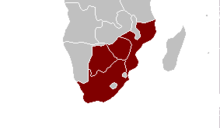Parabuthus transvaalicus
| Parabuthus transvaalicus | |
|---|---|
.jpg) | |
| Scientific classification | |
| Kingdom: | Animalia |
| Phylum: | Arthropoda |
| Class: | Arachnida |
| Order: | Scorpiones |
| Family: | Buthidae |
| Genus: | Parabuthus |
| Species: | P. transvaalicus |
| Binomial name | |
| Parabuthus transvaalicus Purcell, 1899 | |
 | |
Parabuthus transvaalicus (known as the Transvaal thick-tailed scorpion or dark scorpion) is a species of venomous scorpion from dry parts of southern Africa.[1]
Description
Parabuthus transvaalicus grows to a length of 90–110 millimetres (3.5–4.3 in), and is dark brown or black in colour, so it is also known as the Black Thick-Tailed scorpion.[2] Its pincers are thin, but its tail is thickened, with the sting segment being as wide as the rest of the tail.[2] It is nocturnal, resting in a shallow burrow under rocks during the day.[2] It resembles its congener P. villosus, which is less strictly nocturnal, hairier and has a more westerly distribution.[2]The species is the largest (measuring up to 18cm) and only diurnal Buthid in the world.
Distribution
Parabuthus transvaalicus is found in deserts, scrublands and semi-arid regions of Botswana, Mozambique, Zimbabwe ,some parts of the Namib Desert and South Africa.[3]
Sting
Parabuthus transvaalicus is a dangerous scorpion, which can both sting and spray its kurtoxin venom.[2] The first droplet of venom differs from the rest, and is referred to as "pre-venom".[4]
References
- ↑ Norman Larsen. "Parabuthus transvaalicus (Transvaal thick-tailed scorpion)". Biodiversity Explorer. Retrieved October 4, 2012.
- 1 2 3 4 5 Vincent Carruthers (2005). "Spiders and other arachnids". The Wildlife of Southern Africa: a Field Guide to the Animals and Plants of the Region. Struik. pp. 14–27. ISBN 978-1-86872-451-2.
- ↑ Jan Ove Rein (2010). "Parabuthus transvaalicus (Purcell, 1899)". The Scorpion Files. Norges Teknisk-Naturvitenskapelige Universitet. Retrieved November 2, 2010.
- ↑ Bora Inceoglu; Jozsef Lango; Jie Jing; Lili Chen; Fuat Doymaz; Isaac N. Pessah; Bruce D. Hammock (2003). "One scorpion, two venoms: prevenom of Parabuthus transvaalicus acts as an alternative type of venom with distinct mechanism of action". Proceedings of the National Academy of Sciences. 100 (3): 922–927. Bibcode:2003PNAS..100..922I. PMC 298702
 . PMID 12552107. doi:10.1073/pnas.242735499.
. PMID 12552107. doi:10.1073/pnas.242735499.
External links
 Data related to Parabuthus transvaalicus at Wikispecies
Data related to Parabuthus transvaalicus at Wikispecies